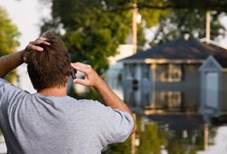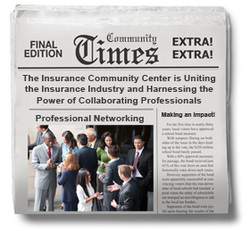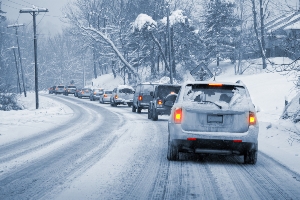 The winter months can be a dangerous time for drivers, with icy surfaces, inclement weather, and reduced visibility making roads more difficult to navigate. Here are some tips for reaching your destination safely while driving in winter conditions:
How to drive safely in winter conditions. (2015, January 1). Retrieved January 1, 2015, from http://www.theonion.com/articles/how-to-drive-safely-in-winter-conditions,37691/
0 Comments
 Check your Cape Cod Flood Map changes with Calfee Insurance Check your Cape Cod Flood Map changes with Calfee Insurance Just a few inches of water from a flood can cause tens of thousands of dollars in damage. From 2008 to 2012, the average residential flood claim amounted to more than $38,000. Flood insurance is the best way to protect yourself from devastating financial loss. Flood insurance is available to homeowners, renters, condo owners/renters, and commercial owners/renters. Costs vary depending on how much insurance is purchased, what it covers and the property's flood risk. All policy forms provide coverage for buildings and contents. However, you might want to discuss insuring personal property with your agent, since contents coverage is optional. Typically, there's a 30-day waiting period from date of purchase before your policy goes into effect. That means now is the best time to buy flood insurance. NHC Hurricane Specialist John Cangialosi discusses the deadly danger of inland flooding caused by tropical cyclones.
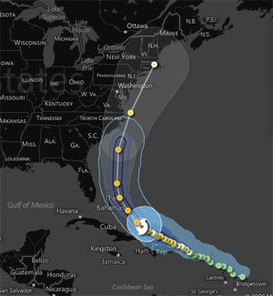 As hurricane season approaches we want to remind you that hurricane preparedness is of the utmost importance. Hurricane Sandy, the second costliest storm in U.S. history causing an estimated $50 billion in damage certainly show how devastating a storm can be and reminds us that we should not be complacent, but be prepared for severe weather events. We urge you to take the time to put together your personal hurricane kit to protect your family and property in the event that a storm impacts us this year. In addition to preparing for the safety of your family, it is a good time to review your homeowners policy with us to make absolutely certain that you have the coverages you need to protect your property. Replacement Cost - the differences between the replacement cost of your home and its market value in today's economy is a prevalent topic of discussion. With today's depressed market values, it i even more important that your Homeowners Coverage A limit is insured for 100% of the replacement value of your home. Deductibles - your homeowners policy has two deductibles, one for 'all other perils' (AP) and one for 'hurricanes' or it may be for all 'wind damage.' Your MPIUA policy will have a higher deductible for any 'wind' damage. But your UPC Insurance policy would have a 'Hurricane' deductible that applies only during a 'named hurricane.' Otherwise, your lower 'all other perils' deductible would be applied. Flood - we want to remind your that your homeowner's policy does not cover flood. Should a storm occur and your property becomes flooded, in order for you to have coverage you must have a separate flood policy.
 The risk of catastrophic loss during hurricane season requires an innovative approach to property coverage—and a rapid response when losses occur. For over 40 years, Lexington Insurance Company has helped our brokers and clients prepare for, protect against, and recover from catastrophic losses. We are the leading U.S.-based surplus lines insurer, and a property and casualty market leader. Make sure you’re a step ahead of risk this hurricane season. Watch LexTV for the latest on hurricane risk and coverage solutions. Hurricane 2012 Update Dr. Phil Klotzbach updates his 2012 seasonal hurricane forecast and shares his outlook for the remainder of the season. This episode also introduces Lexington's new Hurricane Infographic which will help streamline the understanding of a hurricane event. All interests from Louisiana to Mississippi, Alabama and the Florida Panhandle should rush preparations to completion. 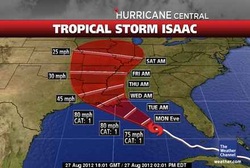 If peak storm surge occurs at high tide, peak water levels above ground could reach the following depths as Isaac moves by: - Southeast Louisiana, Miss., Ala. coasts: 6-12 feet - South-central Louisiana: 3-6 feet - Florida Panhandle: 3-6 feet - Florida west coast from Apalachicola to south of Naples: 1-3 feet Even as Isaac's center of circulation moves by, locally heavy rainbands can be expected. Another 1-3" of rain is possible in central and south Florida with locally higher amounts. Isolated storm total rainfalls of 15" are possible in central and South Florida. Rainfall amounts over 10" are likely as Isaac slows down immediately prior to, and after landfall, in southeast Louisiana, southern Alabama, Mississippi and the western Florida Panhandle. Isolated 20" amounts are possible. Hurricane threat index, current information, satellite imagery, watches/warnings and computer model track graphics are below. (TRACK ISAAC: Interactive hurricane tracker) View more expert analysis from Senior Meteorologist Stu Ostro at our Tropical Update article. You can find a detailed look at the Gulf Coast storm surge, wind and flooding threats by clicking on this link and you can ensure you know which friends may be in harms way through our My Friends Weather tool. (MORE: Live updates and analysis on Isaac) 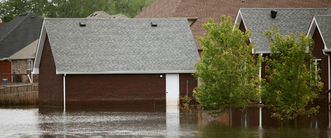 Before a Flood What would you do if your property were flooded? Are you prepared? Even if you feel you live in a community with a low risk of flooding, remember that anywhere it rains, it can flood. Just because you haven't experienced a flood in the past, doesn't mean you won't in the future. Flood risk isn't just based on history; it's also based on a number of factors including rainfall , topography, flood-control measures, river-flow and tidal-surge data, and changes due to new construction and development. Flood-hazard maps have been created to show the flood risk for your community, which helps determine the type offlood insurance coverage you will need since standard homeowners insurance doesn't cover flooding. The lower the degree of risk, the lower the flood insurance premium. In addition to having flood insurance, knowing following flood hazard terms will help you recognize and prepare for a flood. To prepare for a flood, you should:
|
better Insurance
|
-
HOME
- Send me a Home Insurance Quote >
- FLOOD Insurance, Massachusetts >
- Cape Cod Home Insurance
- Pay Your Home Insurance Bill Online
- Ordinance or Law Coverage
- How to Prevent a Claim on your Home Insurance Policy
- Videos - Cape Cod Real Estate Tips >
- Cape Cod Massachusetts Arbella Insurance Discounts
- Cape Cod Massachusetts Lloyds of London Home Insurance
- Safety Insurance Discounts for Cape Cod, Massachusetts
- MPIUA - MA Property Insurance Underwriting Association "Fair Plan"
- Cape Cod Massachusetts Home Protection Insurance
- Hurricane Preparedness >
-
AUTO
- Send me an Auto Insurance Quote for Cape Cod, Massachusetts
- BOAT Insurance >
- Cape Cod, MA Dept. of Motor Vehicles
- Cape Cod Massachusetts - Report an Auto Insurance Claim
- Auto Insurance Quote - CAR BUYING TIPS : Auto Insurance for Cape Cod, MA
- InControl Driver Training
- Car Insurance for Cape Cod Massachusetts - Arbella Insurance - Send me an Auto Quote >
- Plymouth Rock - Send me an Auto Quote >
- Encompass Insurance Discounts
- Safety Insurance - Send me an Auto Quote >
- Travelers Insurance Discounts
- Progressive Insurance - Send me an Auto Quote
- LIFE
- OFFICES
- ABOUT US
- Stay Home
- Home Insurance Explained
- Agent Login
- Privacy Policy
- Videos - Cape Cod Real Estate Investing, Taxes & Insurance
- Videos - Cape Cod Coastal Real Estate
- Português
Arthur D. Calfee Insurance Agency, Inc. is a friendly local insurance agency proudly offering Massachusetts, Cape Cod and the Islands. A-Excellent AM Best rating, A+ Excellent by the BBB
Using innovative thinking, cutting-edge tools and expert resources at national and local levels, we deliver the best possible outcome on every policy we manage. Need Home Insurance? Easy, Fast, & Secure Home Insurance. Get Free Quotes 100% Online Now! Available 24/7. Affordable Rates. Cover Your Biggest Investments. Get a homeowners insurance quote, find coverage options. We'll help you understand and customize the right home insurance coverage for you.
Home is where your heart is—along with a healthy chunk of your net worth. Get started today with a free homeowner's quote.
Compare home insurance quotes today and save on protection for your biggest investment. Build a Custom Policy & Make the Switch! Our local underwriting professionals focus exclusively on finding the best home insurance, homeowner's insurance, hazard insurance, investment property insurance, flood insurance, flood zone information, vacation home insurance, second home insurance, auto insurance, collector car insurance, business insurance, general liability insurance, property insurance, professional liability insurance, contractor's liability insurance, worker's comp insurance, key man insurance, whole life insurance, term life insurance, group or personal disability, & long-term care insurance policies to patrons in the following Cape Cod, Massachusetts towns, communities and villages: Barnstable, Bourne, Pocasset, Brewster, Buzzards Bay, Centerville, Chatham, Cotuit, Craigville, Dennis, East Dennis, Eastham, Falmouth, East Falmouth, Hatchville, West Falmouth, North Falmouth, Woods Hole, Harwich, Hyannis, Hyannisport, Martha's Vineyard, Nantucket, Marstons Mills, Mashpee, Orleans, Osterville, Provincetown, Sandwich, Sagamore, Sagamore Beach, Truro, Wellfleet, Yarmouth, and Yarmouthport. Real-Time Pricing. Insurance coverage: Wind Damage, Fire Loss, Water Damage. Protect your home and belongings. Low Rates For Your Best Options to Save Money On Great Coverage! Get a quote today. Home insurance helps protect your house and your family.
Using innovative thinking, cutting-edge tools and expert resources at national and local levels, we deliver the best possible outcome on every policy we manage. Need Home Insurance? Easy, Fast, & Secure Home Insurance. Get Free Quotes 100% Online Now! Available 24/7. Affordable Rates. Cover Your Biggest Investments. Get a homeowners insurance quote, find coverage options. We'll help you understand and customize the right home insurance coverage for you.
Home is where your heart is—along with a healthy chunk of your net worth. Get started today with a free homeowner's quote.
Compare home insurance quotes today and save on protection for your biggest investment. Build a Custom Policy & Make the Switch! Our local underwriting professionals focus exclusively on finding the best home insurance, homeowner's insurance, hazard insurance, investment property insurance, flood insurance, flood zone information, vacation home insurance, second home insurance, auto insurance, collector car insurance, business insurance, general liability insurance, property insurance, professional liability insurance, contractor's liability insurance, worker's comp insurance, key man insurance, whole life insurance, term life insurance, group or personal disability, & long-term care insurance policies to patrons in the following Cape Cod, Massachusetts towns, communities and villages: Barnstable, Bourne, Pocasset, Brewster, Buzzards Bay, Centerville, Chatham, Cotuit, Craigville, Dennis, East Dennis, Eastham, Falmouth, East Falmouth, Hatchville, West Falmouth, North Falmouth, Woods Hole, Harwich, Hyannis, Hyannisport, Martha's Vineyard, Nantucket, Marstons Mills, Mashpee, Orleans, Osterville, Provincetown, Sandwich, Sagamore, Sagamore Beach, Truro, Wellfleet, Yarmouth, and Yarmouthport. Real-Time Pricing. Insurance coverage: Wind Damage, Fire Loss, Water Damage. Protect your home and belongings. Low Rates For Your Best Options to Save Money On Great Coverage! Get a quote today. Home insurance helps protect your house and your family.
Testimonials & Endorsements for the Best Insurance Agent on Cape Cod, MA
PHONE: (800) 479-2601 CUSTOMER SUPPORT & SERVICE
Please note: The above is meant as general information to help you understand the different aspects of insurance. This information is not an insurance policy, does not refer to any specific insurance policy, and does not modify any provisions, limitations, or exclusions expressly stated in any insurance policy. Descriptions of all coverages and other features on this page are necessarily brief; in order to fully understand the coverages and other features of a specific insurance policy, we encourage you to read the applicable policy and/or speak to an insurance representative. Coverages and other features vary between insurers, vary by state, and are not available in all states. Whether an accident or other loss is covered is subject to the terms and conditions of the actual insurance policy or policies involved in the claim. References to average or typical premiums, amounts of losses, deductibles, costs of coverages/repair, etc., are illustrative and may not apply to your situation. We are not responsible for the content of any third-party sites linked from this page.
© 2024 Copyright, Arthur D. Calfee Insurance Agency, Inc.
Calfee Cares.® Privacy Policy
Calfee Cares.® Privacy Policy


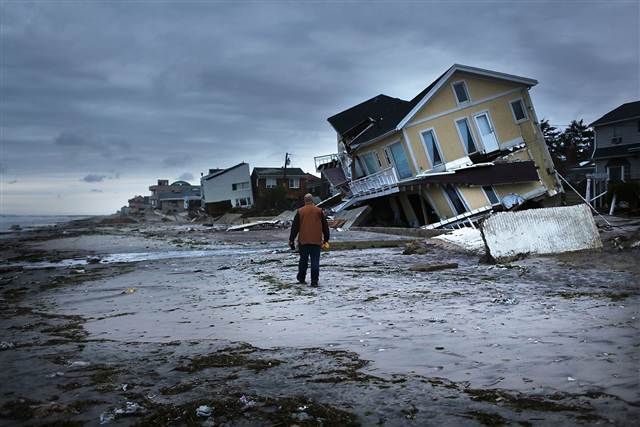
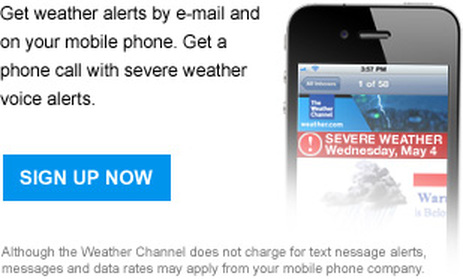





 RSS Feed
RSS Feed





